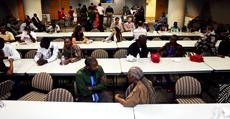As the Somali civil war continues into its third year, some refugees now find themselves starting over in Tucson.
Around 40 UA students and community members gathered March 16 for a public educational session about the growing Somali Bantu refugee population in Tucson.
“”We wanted to give the city of Tucson a chance to learn about who the Somali Bantu are, where they’re from, and how they got to Tucson,”” said Jessica Forster, UA alum and Volunteer and Resource Development Coordinator for the Somali Bantu Association of Tucson, Arizona, who hosted the event.
At the event was Mursalm Ali, a Pima Community College student who next semester will be the first refugee from SBATA to attend the UA. Ali has been in the U.S. since 2004 and said he plans to major in international studies and political science.
“”I’m really excited to go to the UA, but I don’t know how it’s going to be my first year,”” Ali said. “”I’m a little nervous. I was told that it’s not like Pima, that one course has five books, so it’s going to be expensive.””
The Somali Bantu are an ethnic minority primarily located in southern Somalia. Most Somali Bantu refugees were forced to flee their homes as a result of the ongoing civil war, which has raged since 1991 and left hundreds of thousands dead within the country.
“”There’s a population of about 800 Somali Bantu refugees in Tucson, and the majority of people who live here have no idea that (the refugees) live here,”” Forster said.
SBATA is a non-profit organization funded by the Department of Health and Human Services. The group qualifies as a “”refugee mutual assistance association”” because over 50 percent of board members are refugees, Forster said, but most of the group’s volunteer workers are UA students.
The event, held at the Joel D. Valdez Main Library, 101 N. Stone Ave., included slide presentations about the Somali Bantu by Forster and Mohamed Iman, a Catalina High School senior and Somali Bantu refugee.
The event also featured a question-and-answer session with Abdi Abdi, SBATA’s executive director.
The hardest part of being relocated to the U.S. is adapting to the educational system here and preparing for the citizenship test, because most refugees have never been academically tested before, Abdi said.
He also addressed the challenges posed by assimilation in a foreign culture.
“”I want people to preserve their heritage,”” Abdi said. “”The part I like is integration.””
SBATA’s mission is essentially to facilitate the integration process by offering English-language courses, governmental paperwork assistance, and other services, Forster said.
“”People need to understand that this is an extremely vulnerable population,”” she said. “”They came to the United States after spending 12 years in refugee camps, and before that they were farmers and agricultural workers, but a very oppressed population. We just really want people to understand and have compassion for this population.””









